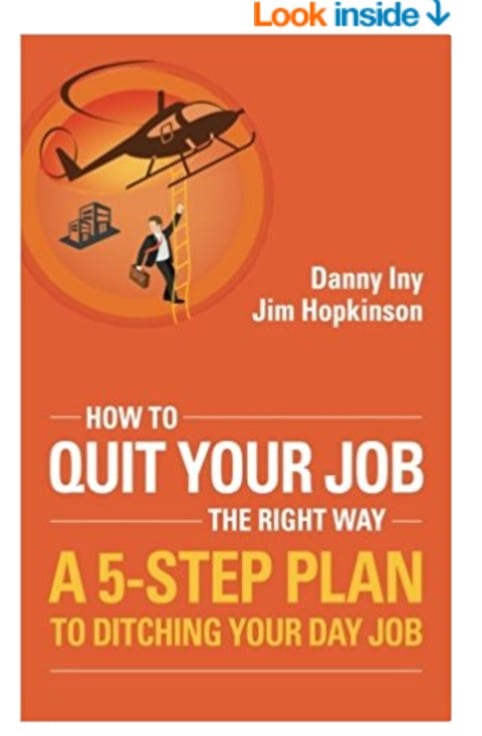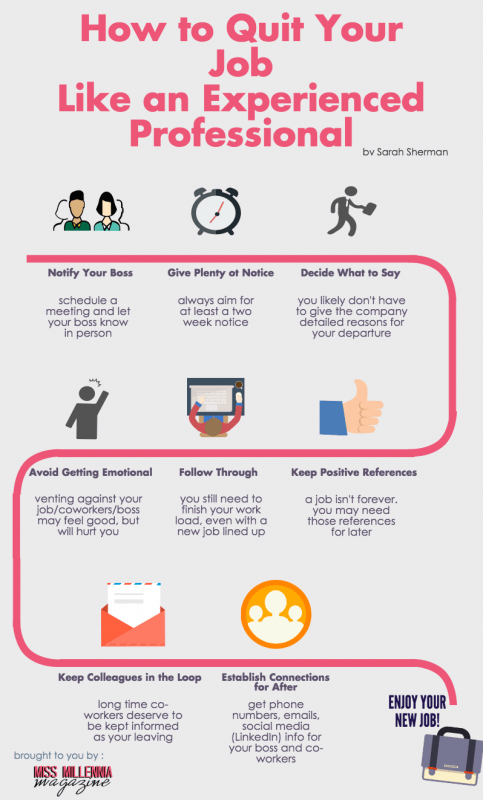How to Quit Your Job Like an Experienced Professional
Quitting your job can be terrifying. In some instances, you could be leaving behind a job that you’ve had for years. Even if you’ve left jobs before, you could still have questions of professional courtesy: How much notice do you need to give? Do you tell your boss in person or should you write a letter up? Who else do you tell?
Not adhering proper protocol could cost you the respect of colleagues and remove your boss from your reference list. Follow the steps below to ensure you’re leaving on the best possible terms.
1. Notify Your Boss in Person
This could potentially vary from job to job, but the general rule of thumb is that you should always schedule a meeting and let your boss know in person. It shows respect, self-confidence and that you have strong interpersonal skills.
You may not necessarily need one, but be prepared to write a resignation letter. Higher ups and HR may require one even after you’ve told your boss about your departure.
According to Forbes:
“There’s no need to sugar coat or get creative in the beginning; just state the position you’re resigning from and the effective date. While you probably shared with your boss your reasons for leaving, you don’t need to describe them here—keeping it simple is perfectly fine.”
2. Give Plenty of Notice
Giving a two-week notice is the recognized norm. You can, however, come across a situation in which you can’t do the full two weeks notice. In those situations, you should work with your employer to do the absolute most you can to ease the transition from your absence.
For employees with a position that requires a specialized skill set, it’s recommended to give more advanced warning. In some cases, you may be the only ones with the knowledge of the area you’re handling, and if you give a little more notice, you might be able to transition that knowledge before departing.
Under no circumstances should you ever NOT give notice. It’s disrespectful to both your boss and your co-workers when you quit a job without notice. Work will have to be picked up by the rest of the workers and it will take longer to find a replacement for you on such short notice.
3. Decide What To Say
Barring a non-compete clause in your contract or a counteroffer situation, you don’t have to give the company detailed reasons for your departure.
But if you have a strong relationship with your boss, you may want to offer constructive criticism on what the organization can do to improve or retain employees and why you are leaving your position, but you do risk backlash when you decide to do that.
4. Avoid Emotional Outbursts
At the end of it all, you may feel like you can say what you’re really thinking. Venting all your frustrations about your job or boss may provide some momentary bliss, but it can haunt you later.
Things have a way of going back to people and you risk losing endorsements with that. It’s also possible you could work for him or her again in the future. So think before you start ranting.
5. Follow Through
This goes back to your two-week notice. You may be eager to start your new job, but with a workload still needing to be done, you may need to stay longer. It looks better for you to consider your employer and co-workers when you’re leaving than thinking just about yourself.
It’s always much better to be upfront at the beginning of the interview process, so consider telling your new job that two weeks may not be enough notice for your current employer.
6. You Want Everyone to be a Positive Reference
Satisfied that your listed reference from the company holds you in high regard, you may become unconcerned with the opinions of other colleagues, disregarding office protocol on matters such as arriving on time or preparing for meetings.
But it’s important to leave a good impression behind with everyone you interact with. Employers can use avenues like social media to find non-listed references and based on your lackluster performance during the final weeks, he or she may paint an unflattering portrait about you.
7. Keep Colleagues in the Loop
Co-workers you’ve known for years merit a heads up about your decision rather than the sight of an empty desk and days of speculating about what happened to their colleague. In an announcement email, write about your positive experiences working for the company and avoid trashing it.
“Your former colleagues and supervisors are a certifiable networking goldmine: They know your background, they work in your sector, and they have their own set of professional contacts.”
Additionally, you should make a strong effort to gain information from your co-workers so you can keep in contact once you leave your job. Phone numbers, emails, and social media connections will keep you in the loop with them for the future so you can always have those references.
Follow these steps and you’ll find yourself easily enjoying your new job.
If you are still feeling shaky about how to quit your J.O.B, check out this book called How to Quit Your Job The Right Way.
References
5 Ways to Keep In Touch With Your Old Boss










